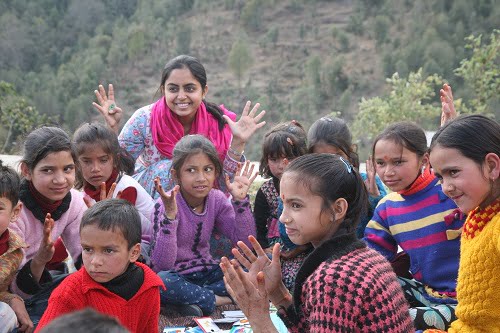If you remember the poignant scene from Toy Story 3 where Andy grows soppy when his vestige of childhood reflected in the toys he played since childhood were about to be discarded away, you can raise your hopes back as The Toy Bank is bringing them back.
Yes, humanity and childhood rescued after all!
Vidyun Goel, Director, The Toy Bank left her high-end job to contribute full time to bring smiles on the faces of underprivileged children.
She has been spreading the impact of toys by creating gender-neutral educative toy libraries and promoting environmental conservation by reusing and recycling toys.

We went ahead and chatted with her about The Toy Bank initiative and its impact.
ED Team: You’ve single-handedly managed The Toy Bank and have been a solo-preneur in terms of getting it to where it is now. How was the journey different from a traditional MNC job?
Vidyun Goel: The idea of The Toy Bank started when I was a child at home. I remember when I was in college, I had put the first carton box outside a few shops and restaurants near North campus where there was visibility but no social media and communication.
I sat in the PCO of my college SRCC and made a thousand phone calls to schools saying that I would request appointments with that school partner. We grew and learnt from each and every distribution.
And I actually thought of closing it down many times because I was doing a full-time corporate job for many years managing finance. I was coming back home at 11 with only weekends to spare. I didn’t have a team that time and I was doing everything single-handedly from packaging toys, coordinating collection centers and schools.
Today, we have centers across 25 states and union territories and probably, we will be close to every state in India by next month.
ED Team: How can general people like us contribute to The Toy Bank?
Vidyun Goel: First of all, there are privileged people who have toys at homes who can give toys, storybooks, and equipment to the 23 collection centers across three cities in India namely Delhi-NCR, Bhopal and Mumbai.
Secondly, you can connect with us directly if you have children going to schools. We would like to conduct a workshop regarding the importance of giving while teaching the three R’s (reuse, recycle and reduce).
Third, if you have time and you want to volunteer, that’s another aspect. You can be good at video making or you can be good at writing something. You can contribute as per your strength.
You can provide new toys as we work with autistic and disabled children who need special aided toys.
ED Team: How big is your team now?
Vidyun Goel: Yes, now we have 10-15 members in our team. We have a big sorting center and they are sending about 10-15 cartons of toys every week.
You Can Also Read: “I Was Called ‘Moti’ In My First Ever Movie” Shibani Bedi Opens Up On ED’s Friendly Fridays
ED Team: How do you find out the need for such toys?
Vidyun Goel: There is always assessment of the need. We are trying to see whether sending these toys will actually make a contribution to the child’s life in a meaningful way or not.
We are working in spaces where children are always present such as angaanwadis, shelter homes, orphanages, schools for underprivileged and panchayat ghars, so there can be some real impact.
ED Team: So are you aiming at villages primarily?
Vidyun Goel: Yes, we are moving away from urban cities towards rural and tribal areas as there is lack of accessibility in such areas. We have done a project in Baramulla district in J&K and Kaprada (Gujarat).
Kaprada is a small village situated between Surat and Maharashtra where the residents speak a language which is neither Marathi nor Gujarati. We have done a couple of projects in the north-eastern villages too where transportation is an issue. Our effort is to reach places where nobody reaches.
ED Team: What has been the biggest impact of your efforts?
Vidyun Goel: For us there’s impact as toys are now not just looked at as a source of leisure. Toys are rather the first source of education for a child.
A child learns to hold from a toy. A child learns colors from a toy.
A child’s cognitive skills develop from holding a toy. It is important to see that toys are a major part of childhood which you are taking away. We are trying to bring back the Right to Play.
ED Team: Can you share with us any story where you impacted someone’s life and it has stayed with you forever?
Vidyun Goel: I am going to tell you stories about how we are seeing the impact on a broader level. We are not distributing toys anymore.
We are creating toy libraries which are a mixed tool of toys and they are graded on the basis of age of the children on the receiving end.
For example, if I am creating a toy library in a panchayat ghar, I will get the list of the children grouped according to the age. Every single toy-kit is mapped and marked to the children that will receive them followed by an impact assessment every three to six months.
The impact can be in terms of the number of hours devoted to playing toys, the improvement of social skills, communication, and reading skills along with attendance.

Vidyun Goel’s Toy Bank seeks to reach out to the underprivileged kids who have missed out on their childhood by giving toys collected across various centers
ED Team: Do you have any takeaway for our readers who are college students mostly trying to find the perfect course or job in their lives?
Vidyun Goel: I’d say don’t take life too seriously. It doesn’t matter. It will unfold on its own. I would suggest everyone to engage in extra-curricular activities after having completed classes on a serious note.
Take part in internships and other opportunities as there is enough free time.
With that it’s a wrap guys.
Hope you found Vidyun’s and The Toy Bank’s journey interesting and inspiring.
Do let us know your feedback in the comments below.
More Recommendations:






























